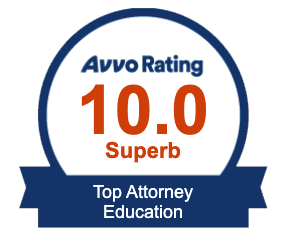Requirements for Review of Child’s IEP.
In the last post, I outlined what IEP and other issues you should consider as school begins for the 2017-2018 school year. Now that school has been in session for about a month, what IEP issues should you be considering at this time? A month is an incremental bench mark to determine how the school year is progressing. A month is probably not enough time to determine if your child is making adequate educational progress under this IEP. Usually a nine-week period – when parents should receive their child’s report card and progress toward IEP goals and objectives – is a better bench mark for making this determination. What parents should be looking for after four or so weeks of school is more about implementation of the IEP. In other words, is the school system implementation the special education and related services that you and the IEP tram agreed upon last school year? Will it be time this semester to convene an IEP meeting with the school system to revise, change, or amend the IEP? Maybe it may be time soon for you and the IEP team to meet to convene an annual IEP meeting. This will depend upon when your child was determined eligible for special education and an IEP was developed for your child. If it is time to develop a new IEP because it is the annual review date, the school system will automatically notify you in writing of this meeting. This is because the IDEA requires the school system to review, revise, change, or amend an IEP for your child at least one time a year. If you merely want to revise, change, or amend the IEP, then you must notify the school system to schedule an IEP meeting before the next annual review.
Why is Periodic Review of your Child’s IEP Important
After about a month after the school year begins, I may receive calls from parents that want to schedule an IEP meeting for certain reasons. For example, the child was experiencing educational problems toward the end of last school year. These problems were not resolved at that time. Now the parents want to revise, review, and amend the IEP to address those problems. Sometimes parents realize after a month or so after the new school year begins that the IEP is not working. In other words, parents notice the child is not receiving the services and instruction set out in the IEP. Sometimes the child begins to exhibit behavioral or learning problems that were not noticed at the end of the last school year. There certainly could be many other reasons why parents want to schedule an IEP meeting after the school year begins. Parents should not hesitate to schedule an IEP meeting earlier in the school year when they notice problems with their child. If you wait until the spring or much later in the school year to address your concerns, then it is likely whatever educational problems you noticed are now much worse. Special education is part science and part art. This means there are scientific or peer review researched services and/or instruction that can be implemented or developed that will benefit your child. But in many cases – especially with behavior problems – it takes time to develop the right combination of positive behavior supports, services, and strategies – to make a noticeable difference in your child’s behavior.
How to Ensure Your Child is Making Educational Progress
Perhaps the best advise I can give to parents who want to review their child’s educational progress toward goals and objectives is ask for documentation. You should ask the school system periodically, or at least at every IEP meeting, for documentation that your child is making educational progress. You should ask for data sheets, narratives, or any other teacher generated report that shows how your child is progressing on his IEP meeting. If there is no or little documentation, then you can assume the child’s teachers have not properly implemented the IEP. If there is no or little documentation, you cannot determine if your child has objectively made educational progress. At IEP meetings, it is typical for teachers to say your child is making “good” progress at school. What does this mean? Unless there is objective evidence – such as data sheets, standardized or criterion referenced tests, or other scientific researched based method of determining your child’s progress – then you should not readily accept the standard response your child is making “good” progress at school.
Resources for IEP Meetings
There are plenty of resources on the Internet to review and secure information about IEPs. One of my favorites is www.wrightslaw.com http://www.wrightslaw.com. If you have any specific questions about your child’s IEP and whether you should request an IEP meeting, please contact me for advise and suggestions.

